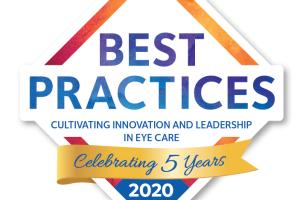Assessing and correcting myopia has long been an integral component of an eye care professional’s job. But as the prevalence and severity of myopia in children has increased in recent years,1 today’s practitioners are looking beyond glasses to more proactive management options that can help slow its progression.
Two optometrists from CooperVision’s 2020 Best Practices have each taken a special interest in myopia management, and are sharing their approaches to education and management, the benefits to their patients and practices—and what they think the future may hold.

Faheem Inayatali, OD
Eye Center of Houston
Houston, Texas

Paul Lin, OD
Valencia Eyecare Optometry
Valencia, California
What is your approach to myopia management within your practice? How has it evolved over time?
Inayatali: It has always been an area of interest for me in my practice. I consult with the parents of my pediatric patients from the get-go, starting with an analysis of a child’s genetic probability of early myopia by looking at the parents’ history and overall retinal health. I explain the results to parents, which brings an initial sense of awareness and then I explain the different management options. The biggest change has been the expansion of my toolbox to help these patients; the advancements in options give us greater flexibility to provide more than a one-step approach.
Lin: Initially, I began to explore myopia management for my own daughter. From there, I wanted to stay at the forefront of the developments myself and educate my staff about it as well. I really want to help my young patients in the long run, so I begin by talking to parents about the available options and establish that seed. Now, we are fortunate in that there are several choices for management, and I think it’s important for them to take part in the decision.
How do you educate parents about myopia management?
Lin: When a pediatric patient’s myopia is progressing and they are in the right age group, I start by explaining as much as possible in the exam room. Then, from the various conferences and seminars I have attended, I developed a slide deck that my staff or I take them through. It provides an explanation of myopia, the risks, and the options for managing the progression. For those who don’t make a decision right away, we follow up with an email summarizing everything we talked about, and keep that communication going. I also have educational videos I’ve made that I share to Facebook to keep it top of mind and help others continue to learn about myopia management.
Inayatali: I begin by breaking down complex processes of eye elongation into digestible concepts with visuals involving the stretching of the retina, and the goal of mitigating long term adverse effects. I make it real by providing probabilities of what might happen down the road, like retinal detachment, tears, various diseases. The most important point is that we can’t go backward, so early intervention is the only way to help prevent or slow down those risks. We take an initial A-scan for a baseline, and then show them a graph of what we’re aiming to do; this provides a useful visual of the importance of taking action sooner rather than later.
How has offering myopia management benefitted your practice?
Lin: Offering myopia management has put me at the forefront of practices in the area, setting me apart. We offer a lot in terms of the latest advancements in technology, so this is just another service we provide that people won’t hear about in many other practices. It also helps me develop longer-term relationships with patients, as it captures them early and I can follow them year after year to see how they are progressing. Then I end up seeing a lot of their family members as well—parents for their own myopia, grandparents for presbyopia, diabetic retinopathy, and so on
Inayatali: The ability to provide different modes of myopia management has been rewarding on multiple levels. For one, specializing in this area is definitely a differentiator for our practice. This is a well-established, growing epidemic in which we have the opportunity to play a significant, positive role, and it’s truly diversified our scope of practice for patient care. In addition, any time you change lives—particularly by altering the trajectory for children—you are going to see an uptick in your information being passed to their family and friends, who also want to obtain these benefits for loved ones.
What do you see as the future of myopia management in your practice?
Lin: I see the future as very bright for this field. We are just at the beginning with the FDA’s approval of CooperVision MiSight® 1 day2, and the introduction of the Brilliant Futures™ Myopia Management Program. When certified through the program, it is very simple to order these lenses now. All you have to do is identify the right patients and take the initiative to explain the concept to them. It may take extra time at first, but it’s rewarding to have happier patients in the long run.
Inayatali: Eventually, with enough ambassadors for myopia management and all of us working together to raise that awareness, we’ll be able to make much more of a dent in the epidemic. We need to stop thinking about eyeglasses as the primary option for children with myopia; for potential candidates, these myopia management advancements are much more proactive in the realm of preventative medicine. There are a lot of adults suffering from visual impairments that could have been prevented if they had intervention at an earlier age. We have the opportunity to impact that change for the next generation.
4 Steps to Gaining Traction in Myopia Management
Education first.
Nearly everyone is familiar with vision correction, but myopia management is a new concept for most. Think of the process of education as a public service. Start with the basics of the importance of early intervention, time outdoors, and the scientific evidence—then everything else falls into place.
Gain comfort in design.
Understand that there are multiple dimensions of myopia management. Find the approved, cutting-edge management options and master those.
Take on “easy” cases to start.
Begin with patients you know—family members, or children of your staff—until you gain the confidence and comfort to take on more.
Don’t shy away from failure—and have a backup plan.
Life’s biggest lessons are learned from past mistakes. Just don’t give up. If one method isn’t the right fit for a patient, or the results don’t meet expectations, let the patient know there may be another course of action. Seek advice from your colleagues as necessary.
For more information about CooperVision’s Best Practices, its honorees (current and past), and updates on how they are working to support and advance the profession, visit www.eyecarebestpractices.com.
1 Holden et al, - Global Prevalence of myopia and high myopia and temporal trends from 2000 through 2050. Ophthalmology 2016. 123(5):1036-1042
2 MiSight® 1 day (omafilcon A) soft (hydrophilic) contact lenses for daily wear are indicated for the correction of myopic ametropia and for slowing the progression of myopia in children with non-diseased eyes, who at the initiation of treatment are 8-12 years of age and have a refraction of -0.75 to -4.00 diopters (spherical equivalent) with ≤ 0.75 diopters of astigmatism. The lens is to be discarded after each removal.








